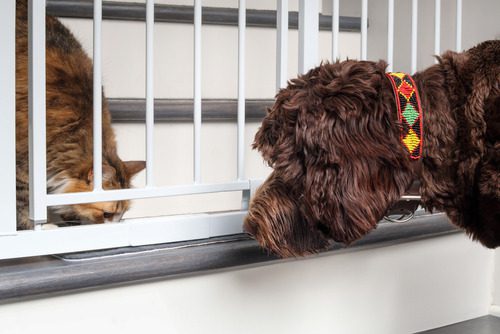Why Your Dog Won’t Stop Barking, and How to Help
If you’re a dog owner, you’ve likely experienced moments when your canine companion just won’t stop barking. It’s a common concern among pet parents, and understanding the underlying causes is the first step toward finding a solution. At Brown Veterinary Hospital in Terre Haute, IN, we encounter numerous cases of persistent barking and are here to share our insights. Remember, for personalized advice or to discuss your dog’s specific situation, don’t hesitate to call us at (812) 645-0715.

Exploring the Reasons Behind Excessive Barking
Barking is a natural behavior for dogs, but when it becomes excessive, it may indicate an underlying issue. Let’s look at the various reasons dogs may bark more than usual.
Communication and Environmental Stimuli
Dogs communicate with humans and other dogs through barking. They might bark to alert you of something unusual in their environment, like a stranger at the door or an unfamiliar sound. Changes in the household, such as new pets, people, or even furniture, can also trigger excessive barking.
Behavioral and Emotional Triggers
Some dogs bark excessively due to behavioral issues like separation anxiety, fear, or territorial behavior. Stressful situations, such as loud noises from thunderstorms or fireworks, can also exacerbate this behavior.
Medical Concerns Linked to Excessive Barking
Persistent barking can sometimes be a symptom of underlying medical issues. Dog owners must recognize that barking might be more than just a behavioral problem and could indicate a health concern.
Pain or Discomfort
One of the primary medical reasons for increased barking in dogs is physical pain or discomfort. Conditions such as dental issues, ear infections, or gastrointestinal problems can cause your dog significant discomfort, leading them to bark more. Dental pain, often overlooked, can be particularly distressing for dogs, causing them to vocalize more frequently. Similarly, ear infections, which are not always visible but quite painful, can lead to an increase in barking.
Cognitive Dysfunction
In older dogs, cognitive dysfunction syndrome (CDS) can cause disorientation and changes in behavior, including increased vocalization. CDS, akin to dementia in humans, affects a dog’s memory, perception, and awareness, often leading to confusion and anxiety, which can manifest as excessive barking, especially during nighttime.
Sensory Decline
Age-related sensory decline, such as hearing loss, can also contribute to excessive barking. Dogs experiencing a loss of hearing may bark more because they cannot hear themselves as well or because they are startled more easily due to their impaired sense.
Neurological Issues
Rarely, neurological conditions can be at play. Seizures or brain abnormalities can cause changes in behavior, including increased vocalization. If your dog’s barking is accompanied by other unusual behaviors, such as disorientation or uncoordinated movement, it may be neurological and a veterinarian should examine your pet right away.
Behavioral Issues and Their Solutions
Addressing behavioral issues can be challenging, but figuring out the cause and addressing it can greatly improve your pet’s quality of life, and the harmony within your home.
Lack of Exercise and Mental Stimulation
A common cause of excessive barking is a lack of physical and mental stimulation. Dogs are naturally active and intelligent animals that require regular exercise and mental engagement. Without adequate physical activity, dogs can develop pent-up energy, leading to behaviors like incessant barking. Incorporating activities such as longer walks, runs, or play sessions can significantly reduce barking. Mental stimulation is equally important. Puzzle toys, training sessions, and interactive games can keep a dog’s mind active and reduce boredom-induced barking.
Anxiety-Related Barking
Anxiety is another significant factor contributing to excessive barking. Dogs may bark excessively in response to anxiety-inducing situations, such as being left alone (separation anxiety), unfamiliar environments, or loud noises like thunderstorms and fireworks. Creating a safe and comfortable space for your dog can help alleviate this anxiety. This might include designating a quiet, cozy area in your home where they can feel secure. Additionally, products like calming collars, anxiety wraps, or diffusers with pheromones can be beneficial.
Territorial Behavior
Dogs often bark to protect their territory from perceived threats, like strangers passing by or other animals. Training your dog to understand that not every outsider or noise is a threat can be helpful. Positive reinforcement training, where good behavior is rewarded, can be effective in reducing territorial barking.
Attention-Seeking Behavior
Sometimes dogs bark simply to get attention. If this is the case, it’s important to avoid inadvertently reinforcing the behavior. Providing attention or treats to quiet a barking dog can teach them that barking is an effective way to get what they want. Instead, focus on rewarding quiet behavior and providing attention when your dog is calm.
When to Seek Help for Your Dog’s Barking
If your dog’s barking is becoming a serious issue at home, it’s time to contact your veterinarian. At Brown Veterinary Hospital, we can conduct a comprehensive examination to rule out any medical reasons for the excessive barking. We’ll discuss your dog’s history, behavior, and environment to provide tailored advice.
In some cases, we might recommend working with a professional dog trainer or a veterinary behaviorist. This can be highly effective, especially for dogs with deep-rooted behavioral issues.
Persistent barking in dogs can be a sign of various issues, ranging from medical to behavioral. At Brown Veterinary Hospital, we understand how concerning and frustrating this can be for pet owners. We’re here to help you identify the cause and find the best solution for your furry companion. If your dog’s barking has become a concern, don’t hesitate to reach out to us at (812) 645-0715 for guidance and support. Together, we can ensure your dog’s health and happiness, and restore peace to your home.
Recent Posts
About Brown Veterinary Hospital
We are here to serve as your partner in keeping your four-legged family member healthy, ensuring you have all the tools you need to provide them with a lifetime of outstanding care. Our animal hospital in Terre Haute offers a full range of services to nurture and extend your pet’s life, from wellness and preventative care to critical care, exotic pet care, and dermatology.





